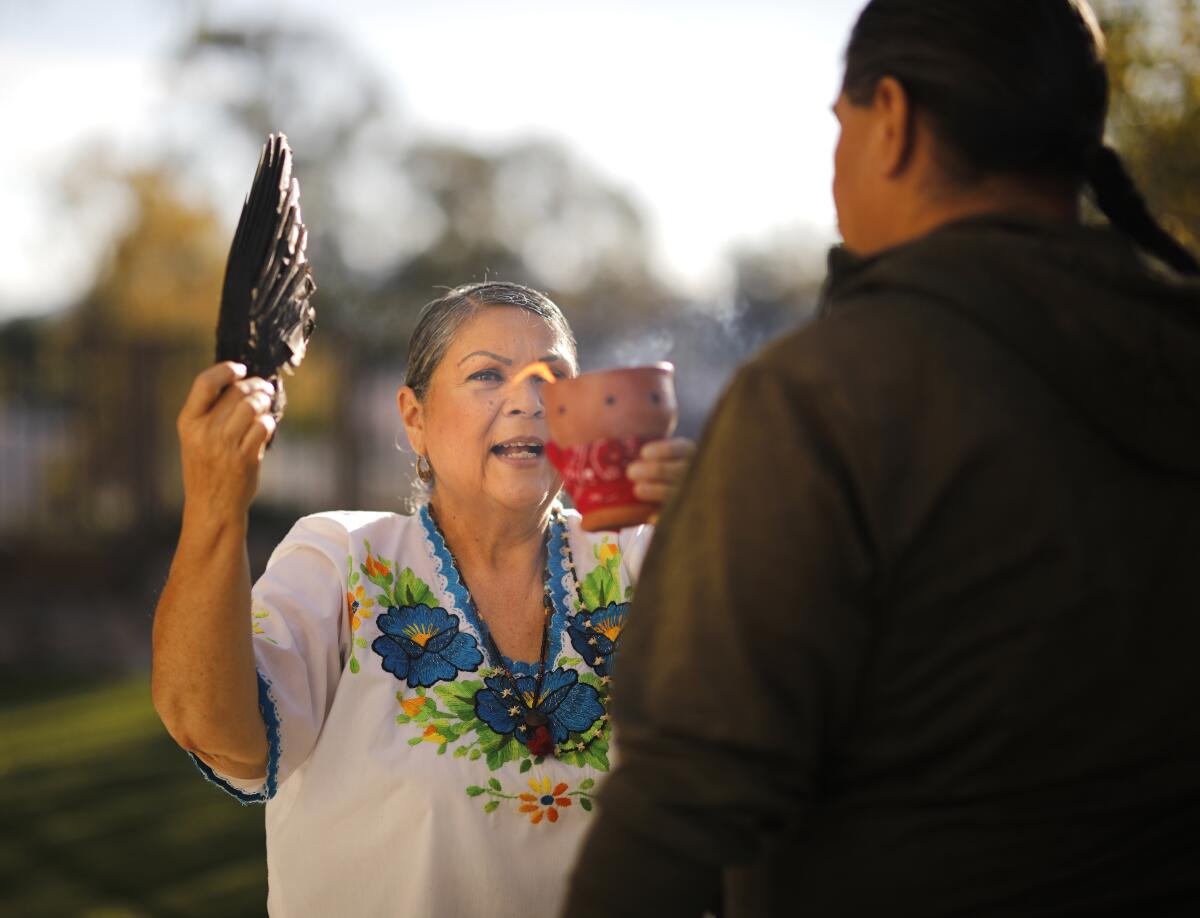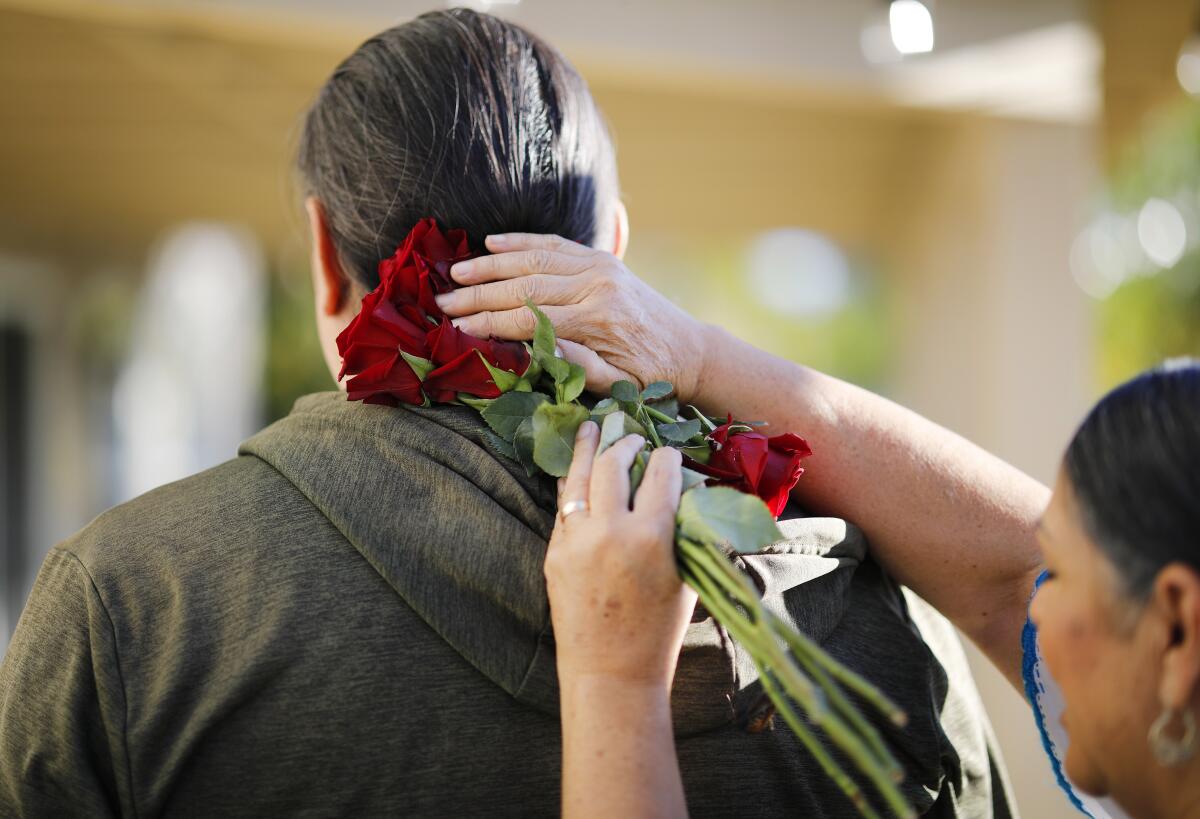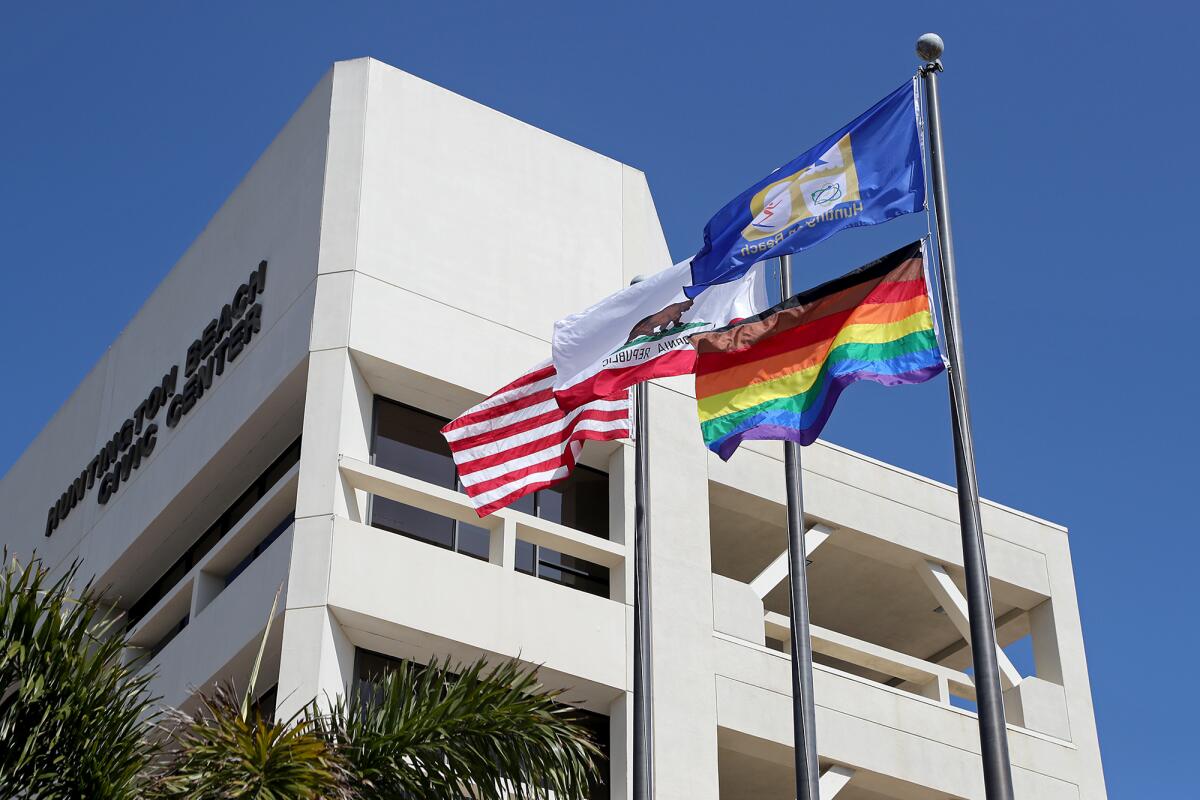For some Latinos, spiritual cleansing fills a mental health void

- Share via
Good morning, and welcome to the Essential California newsletter. It’s Thursday, Feb. 9.
A growing emphasis on mental health care — some of it brought into renewed focus during the pandemic — has led more Americans to seek therapy or other support. But recent data show Latinos are less likely to look for help.
While the number of Black, Asian and white Americans seeking mental health treatment has increased in recent years, the rate for Latinos has barely changed, according to an analysis by the Centers for Disease Control and Prevention.
The reasons why are complicated, but a lack of cultural context contributes to the trend, Karen Garcia, a reporter with the L.A. Times’ Utility Journalism team, told me this week.
“If you don’t find someone that understands your cultural background, or maybe doesn’t even understand the words that you’re using ... not being able to understand those nuances can stop a person from wanting to talk about how they feel,” she said.
That’s why some in the Latino and Indigenous communities have turned to curanderas, or traditional healers. Karen explored how these healers keep ancient traditions of spiritual cleansing alive and what it means to practitioners in a story published this week.
While taking a class focusing on Chicano psychology, Karen became interested in the idea of curanderismo and how spiritual healing “really isn’t valued or understood” in the Western mental health field.
“I wanted to understand why is that and also just get a better understanding of what curanderismo is,” she said.
Her reporting brought her to the mountain community of Alpine in San Diego County, where Grace Sesma, a Mexican and Yaqui curandera, practices with a variety of clients.
“The philosophy behind curanderismo is that diseases are not just caused by physical factors, but also social, emotional, environmental and spiritual ones,” Sesma told Karen.
She was invited to observe several of Sesma’s sessions with clients, which are split between a limpia, or spiritual cleansing, and pláticas, a “heart-to-heart conversation,” she explained.
“[They] were so different to what you would experience if you were seeing a therapist or someone else in the mental health field,” Karen said. “The amount of vulnerability between Grace and her clients really allowed them to open up to her, to talk to her, to share with her.”
It’s not just Latinos and Indigenous people seeking the spiritual healing. Healers and researchers told Karen other Southern Californians not connected to the culture are turning to curanderismo.
“Grace talks about seeing a lot of different people, including ... a lot of LGBTQ folks that feel that they can open up to her as well,” she said.

Curanderismo traditions date to Aztecan, Mayan and Incan tribes, according to researchers, as part of those cultures’ religious beliefs of harmony with nature, spirit and self. The Spanish colonization of Mexico in the early 1500s led healers to incorporate European practices into those Indigenous traditions.
That history instills a deep appreciation in students who want to learn and practice curanderismo, Karen told me. For both healers and those seeking healing, “it’s not something that’s taken lightly,” she explained:
“This isn’t something that’s learned overnight. You can’t take a course in several months, and then, oh, you’re a curandera. It’s a calling ... that you learn over time. You’re an apprentice; you continue to learn, you continue to keep in touch with your elders and as a culture.”
While the benefits of most physical and mental medicinal treatments tend to be straightforward to measure in clinical settings, spiritual healing is personal and difficult to gauge. But practitioners and researchers hope to learn more about how the practices can affect a person’s health.
“Healers like Grace are asking the question: ‘Why can’t we complement doctors and mental health practitioners in traditional allopathic medicine?’” Karen said. “It’s not that she’s saying that her work is better than or will work better than, but it could work for someone else — or it could work in harmony with maybe seeing a therapist.”
You can read Karen’s reporting on curanderismo here.
And now, here’s what’s happening across California:
Note: Some of the sites we link to may limit the number of stories you can access without subscribing.
L.A. STORIES
Is L.A.’s outdoor dining doomed? City leaders are weighing an ordinance that would introduce restrictions and require restaurants to apply for new permits to continue using the sidewalk and parking lot patios created during the pandemic. One restaurant owner called it a “sucker punch” for the struggling industry. Los Angeles Times
Los Angeles leaders approved a plan to shut down the city’s largest gas-fired power plant and replace it with a first-of-its-kind green hydrogen facility. Some celebrated the move as an important step to curb the climate crisis, but many climate and environmental justice activists oppose the switch, citing concerns about the unproven technology and the risks of burning hydrogen. Los Angeles Times
Check out "The Times" podcast for essential news and more
These days, waking up to current events can be, well, daunting. If you’re seeking a more balanced news diet, “The Times” podcast is for you. Gustavo Arellano, along with a diverse set of reporters from the award-winning L.A. Times newsroom, delivers the most interesting stories from the Los Angeles Times every Monday, Wednesday and Friday. Listen and subscribe wherever you get your podcasts.
POLITICS AND GOVERNMENT
The rainbow pride flag will no longer fly over Huntington Beach City Hall. In a tense, packed council meeting, city leaders voted 4 to 3 to amend an ordinance that now excludes the LGBTQ+ standard from being raised on city property. Councilmember Pat Burns, who introduced the measure, said the city “should avoid actions that could easily or mistakenly be perceived as divisive.” Opponents argued that removing the flag, which had flown for six weeks in the spring, is itself a divisive message. Los Angeles Times

Two disabled residents are suing the county and city of Sacramento over tents set up on sidewalks, saying homeless encampments make it dangerous for them to get around. The plaintiffs are seeking class-action status and a court order that would require Sacramento officials to clear tents and debris from the region’s sidewalks. The Sacramento Bee
California is in a minority of U.S. states that do not require schools to screen children for dyslexia. Experts say early diagnosis is key to prevent dyslexic students from falling behind, but the statewide teachers union and others have blocked those efforts. CalMatters
Support our journalism
CRIME, COURTS AND POLICING
Gov. Gavin Newsom told over 100 California prisoners they could get out early. But as of January, a third of those people remained behind bars. One key reason, my colleague Mackenzie Mays reports: “Newsom’s decision to defer to the parole board in the vast majority of his commutations.” Los Angeles Times
An L.A. County sheriff’s deputy is suing the department, claiming some of his fellow deputies are forming a new “gang” in the agency’s East L.A. station. The deputy reported being harassed, assaulted and intentionally put in harm’s way. It marks the latest in a series of allegations about secretive, violent deputy groups at certain stations and jails. Los Angeles Times
HEALTH AND THE ENVIRONMENT
Helping whales flourish could help fight climate change. A recent study of the massive marine mammals shows their bodies hold huge amounts of carbon that would otherwise be in the ocean or atmosphere. Plus, whales’ poop is vital to the growth of organisms that researchers estimate store 22 million metric tons of carbon in the food chain. Los Angeles Times
It’s almost “firefall” time again at Yosemite. The epic optical illusion draws thousands to the eastern side of El Capitan to witness the evening sunlight turn a small waterfall into a red-orange optical illusion. A note for anyone chasing this waterfall: The national park is requiring reservations each weekend for the remainder of February. The Fresno Bee
CALIFORNIA CULTURE
Poet and Cal State Long Beach professor Patty Seyburn shared her “Ode to the Santa Anas.” Here’s an excerpt:
... Ill-willed wind, your effect
on nose, throat, head, makes pummeling the day
into submission more onerous than usual —
more Alp than hill, more Sisyphus than
Jack and Jill.
Read Seyburn’s full poem here.
Free online games
Get our free daily crossword puzzle, sudoku, word search and arcade games in our new game center at latimes.com/games.
AND FINALLY
Keeping with that loving spirit, some of you have been sending us your romantic California-themed Valentine’s prose, aka Calentines. We’ll be featuring the sappiest, wittiest submissions through Valentine’s Day, gussied up by our spectacular design team.
Here’s the first one:

There’s still plenty of time to share your California love. Submit your ideas here. Please keep submissions under 50 words.
Please let us know what we can do to make this newsletter more useful to you. Send comments to [email protected].
Sign up for Essential California
The most important California stories and recommendations in your inbox every morning.
You may occasionally receive promotional content from the Los Angeles Times.




